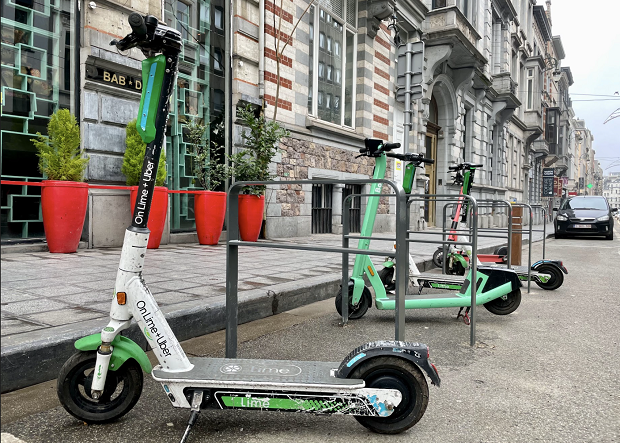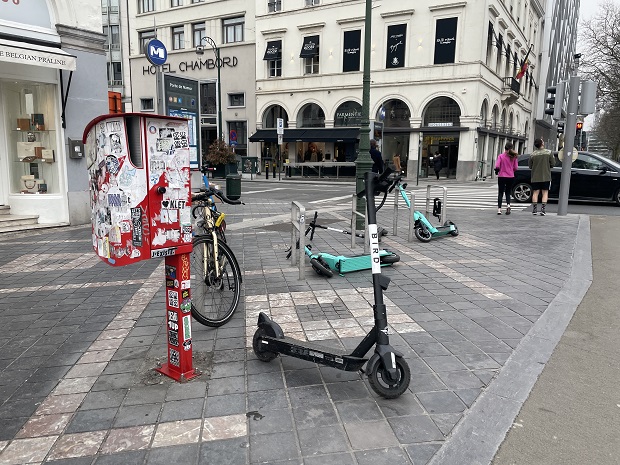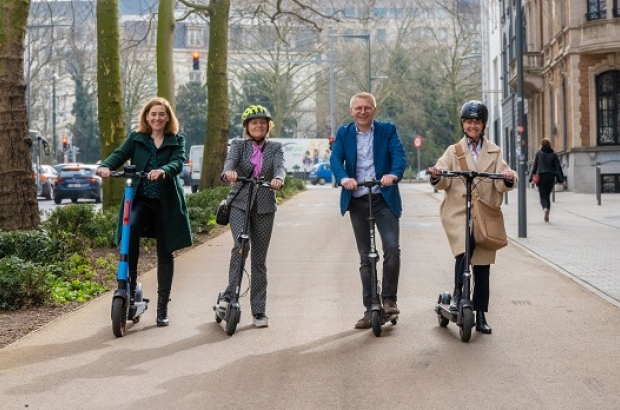- Daily & Weekly newsletters
- Buy & download The Bulletin
- Comment on our articles
Belgium regulates e-scooters: Designated parking, one rider only, no users under 16
Belgium is introducing a series of measures to regulate the use of e-scooters and other modes of micro mobility transport, including designated parking spots, an age restriction for under-16s and a ban on riding on the pavement or carrying a passenger.
“We’re seeing many new forms of mobility in our streets, like e-scooters,” said Flemish minister of mobility and public works Lydia Peeters. “Unfortunately we’re also seeing them already in accident statistics. The need for clear and uniform traffic regulations was therefore pressing.”
Peeters, along with federal minister Georges Gilkinet, Walloon minister Valérie De Bue and Brussels minister Elke Van den Brandt set up an Inter-federal Working Group to determine a clear and unambiguous legal framework for the whole country.
Brussels recently decided to end the indiscriminate parking of self-service e-scooters. The regional parliament voted on the creation of dedicated parking zones around the city, enforced by threatening sanctions on scooter operators.
Introduction of parking zones
Currently, scooters may be parked on the pavement as long as they do not obstruct the passage of pedestrians and other sidewalk users. But in practice, scooters are often abandoned in ways that create chaos and make it more difficult for pedestrians and cyclists.
Now there will be no-parking zones (except for persons with reduced mobility), compulsory parking zones (drop off zones) and zones where parking will be allowed without obstructing passage. Faulty parking will count as an offence of the 2nd degree, with a fine of €116.

Restriction for young people under 16
Last year, one out of seven accidents with an electric scooter involved a young person under 16. In those accidents, 130 people were injured.
“In view of the objective of road safety, it is important to avoid children and young teenagers driving vehicles up to 25km/h, which are not always stable or easy to steer,” the ministers explained.
“On the seafront or in play streets, young people can continue to use their scooters, hoverboards or other devices because it is safer there and the risk of accidents is lower.”
Prohibition to ride on the pavement
Riding a scooter on the pavement endangers pedestrians, the ministers said, and the current rule that allows riding at walking pace isn’t sufficiently respected. That rule is therefore being changed to a full ban on using scooters on pavements, with the exception of people with reduced mobility using a mobility scooter.
In pedestrian zones, a sign will indicate whether an e-scooter is allowed or not, and if allowed, it will be at walking pace. Violations will incur a fine of €58.
Prohibition for two to ride on a scooter
It wasn't previously forbidden by law to carry a passenger on a scooter, though operators often prohibit doing so in their terms and conditions.
“E-scooters are not as stable as bicycles and the risks of falling and serious injury are more serious,” the ministers said. “Therefore, from now on, it is forbidden to take someone with you on your e-scooter.”
Doing so can incur a fine of €58, which will be collected immediately.

Reminders of existing laws
The ministers also emphasised existing rules that apply to the use of micro mobility already enshrined in the Highway Code. These include a ban on driving faster than 25km/h on a scooter or using scooters with a saddle.
“Together with public transport, these new forms of mobility have made traffic in our cities easier and smoother,” said Georges Gilkinet, Federal Minister of Mobility.
“It is important for users to learn how to deal with this properly and to provide a better legal framework. In the framework of the Inter-Federal Plan for Road Safety, I am working together with my fellow ministers from the regions to strike a better balance so that every road user has his or her place on the public roads and feels safe.”
Traffic institute Vias welcomed the new rules, saying that “although electric scooters seem easy to use, they are not so easy to handle, partly because of the small wheels.”
The institute also pointed out that more than one accident in four (28%) involving an electric scooter happened at night or in low visibility conditions. They suggest users wear a fluorescent vest instead of relying on the mandatory reflectors on the scooter itself, which it says are often difficult to install on certain models.
Photo (main image; left to right): Elke Van den Brandt, Lydia Peeters, Georges Gilkinet, Valérie De Bue




















Comments
Belgium has lots of rules but nobody to enforce them.